by timbaros
Philomena press conference held at the Mayfair Hotel on October 16th, 2013 with Judi Dench, Steve Coogan, Director Stephen Frears and co-writer Jeff Pope:
Steve Coogan: The first six months before we even wrote a word, we went over and and over the story. The comedy, its best when it hangs on reality, a proper story. One interesting thing about the process was being in the room with all the characters. That is one great advantage, in working with director Stephen Frears. At one point I was in the room with a nun, Philomena, Martin, and so that dialogue was brilliant. I saw myself as someone who was holding a big net, catching butterflies, which were lines of wonderful dialogue delivered in the style of the characters.
Frears: That sounds alright to me.
SC: I initially didn’t want to write it. I thought it was an interesting story and I think I want to pursue it. I was told to write it but I told the producers that I am better with comedy and not drama, and they said that I need someone good to write it with, so they introduced me to Jeff Pope. Now we are bestest bestest friends. It was a real revelation. I learned from him and we collaborated in the two cents. We both brought different things to it. Jeff would talk about the structure of the whole thing and the rhythm, and I was more about the myopic detail of character and dialogue. So we both had distinct roles. It was as much fun writing as it was acting.
Dench: The story was read to me, and immediately I wanted to do it, before there was really any tweaking to the script. You have only have to hear the story and hear about Philomena. That is irresistible to play.
Question: Did you have any sense of responsibility to portray these people on the big screen?
JD: That is a very good question. The only thing that concerns me when I’m playing somebody who is alive, I played Iris Murdock who had not long died, responsibility very very heavy on my shoulders, and I feel with this film, as long as you tell Philomena’s story, and it were true to her, which Jeff and Steve had already done by writing the story, we must not sell her short. She is a most remarkable woman, and all my concern was that we must be absolutely true to her story. I know her, I met her before we started filming, I haven’t seen her since she has seen the film. I can’t wait for later today to see how she feels about the film.
SC: I’ve played a handful of real people, I played myself. When I played Martin it was about, there’s a certain amount of artistic license with the film, the way me and Jeff wrote it, but the fundamentals, we were quite ethical where we invented things, what we were quite specific was that the fundamental facts of the story were intact and true, and the way we wrote the characters was ok to take a little license here and there, but in Martin I would say 50% Martin and 30% me, and 20% bits and bobs of somebody else. The point is that we honored the characters the way they were treated, and I spoke to Philomena twice and she has seen it and she is very pleased with it. She’s seen it twice in fact.
JD: She will see it three times tonight.
SC: The first time there are concerns that anyone would be self conscious of someone watching portray a part of their life on screen, but she is happy. She said the second time she watched it she enjoyed it knowing that she was dignified by the film.
Question: You bring such emotional depth to your character, and I easily got lost in your performance. Being a mother yourself, how did that influence your performance.
JD: Well, um, everything, every part that you approach, has to be somehow rooted in yourself, you have to somehow root everything, so that it is not just words that are coming out of your mouth. Straight in and goes out again. So that every experience, that you experience yourself, you use. Because that is our craft. So having a daughter and a grandson I could certainly relate to the fact that this child who you simple dote on being taken away from you at an early age, and every single kind of emotion has to go through. I once said this to somebody when I was playing Lady McBeth, they said that’s tricky, what do you about murdering your husband’s cousin. How do you approach that? And there are of course things that are not in your personal repertoire that you have to personally understand reading and watching other things and hearing other people talk about them. So that everything is relatable I suppose, but then having sad that, that is not the story, I then have relate it back to Philomena. It is quite a tangled kind of piece of string that touches all sorts of parts, and in the end you can map to something that is as near the truth to the person that you can possibly manage.
Question: What did you learn from each other that surprised you?
JD: I will tell you what I learned about him (Coogan). Now he does stand up and comedy, and I do serious acting, I think he should stick to that, because he seemed to seamlessly pass over into serious acting where I could no more get up and tell a joke to a lot of people in a room then I could actually fly on my own into a room. Some people could do it all.
SC: I told her to say that.
JD: Comedy easily seemed to be passed over me.
SC: Yes, getting to Judi. When we were writing it, Judi was number one on our wish list and our wish came true, um, but when it came time to filming it, we weren’t sure who was going to play Martin but in the end I decided that it would be best that I did. And but of course I was very nervous. One was if I was able to share the screen with this iconic figure sitting next to me (Dench) and uh that I knew that I would have to um, bring my, um, pull my socks up, pull my finger out, pull lots of things, and um, and, but when I was on set it was great because Judi and I didn’t spend a lot of times anxiously talking about the subtext of the script, most of the time we talked about everything but what we were doing. It is quite a heavy difficult subject matter, it was a relief to talk about anything but the script. There was a lot of laughing, a lot of laughter.
SF: There was a shared love of fast cars, wasn’t it?
SC: But you know it was it was very relaxed, and there was lots of, and in terms of what Judi said about the comedy in actual fact in this film I actually played the straight man. All the funny, um, lines I gave to Judi, because it made me look generous and her look funny.
Question: What made it for you to want to sign on?
SF: Good story. On top of this story is what I would like to call it a romantic comedy. Odd couple sort of, I liked the challenge of doing both things at the same time it seemed very very interesting, very moving and very funny. Good god, what more do people want? Pity about the cast.
Q: Jeff spoke about your passion for the project, I wondered where that passion came from? Your parents acted as foster parents when you were a kid. I wonder if it came from there.
SC: All those things you mentioned played a part in my being interested, I think because I am Irish, because I was raised Catholic, I felt that I had some license to talk about it and avoid the cliches because there are a lot of cliches, and um, its true, my family are, still, some of them are still very devout catholics, and not, and in a way I sort of wanted to, from a writing point of view, wanted to address in a grown up way and in a way that was very um about , really , tolerance and understanding, and learning to live and love with people who have different points of view. Part of that is where I am from, in fact, I was raised a Catholic, even though I am not one now, a lot of the values I have are because of my family’s upbringing, things that are very important, which I value very highly. Certainly my personal experience plays a part, formed the dialogue.
Q: Philomena’s faith is rooted in forgiveness. How do you approach something like that?
JD: Well, I would like to think that in those circumstances I would’ve behaved like that., that I know that I wouldn’t have done. That I think , i think, I think that Stephen has touched on, that is what the film is about. The power of forgiveness of some. After all the things that have happened, we know all about those things, we know about the issue of children being sold, and adopted, taken away, but what is extraordinary is how these two people come through something like that. How both of them do. I think that she’s one of the most considerable people I have ever met, Philomena. That that that all can happen to you. That she does, that they made that journey, the two of them, and exactly she has lost her son in actual fact gains, gains something else. She gains in a way another son. But her faith is strong as it was before. and that is no slouch. I wish I could say that’s how I would’ve behaved, I but I know it isn’t.
Q: How important was it for you to downplay emotions?
Jeff Pope: The theme of forgiveness is very interesting. We started with it, at least, in talking to Philomena and her daughter Jane, we realized that Philomena had arrived to a point where she did truly forgive, and it wasn’t forgiveness on an intellectual level, say, as Lord Lomford famously said practice forgiveness, Philomena’s came from within. She really truly had forgiven those people that had caused so much misery in her life. Jane (the real daughter of Philomena), who a bit like Steve, if I may, next generation Catholic, had a more pragmatic view of the world and she hadn’t, so we we decided that that’s how we would play the end, and that Philomena in a magnificent act of forgiveness. And Jane’s point of view was represented with Martin and that he I think that was also a way of venting the way we feel the audience would feel at that point and they there there was an anger as a viewer in watching it, we feel that it needed to be aired as a counterpoint
SC: and also that we do not want to be told as a prescriptive this is the correct way you should be behave. We don’t want to wrap everything neatly in a bow at the end of the story. We wanted to show a deep resolution but there is kind of a tolerance equilibrium that could be achieved in the lives of these characters rather than this finality of conclusive closure as the Americans say about the whole thing, so it was important to recognize that the different feelings the audience would have, and you can admire what Philomena does without necessarily thinking its entirely correct even, but its quite new that we didn’t want the ending to be overly simplistic if you like.
JP: If there is a, its not really a polemic, not a polemic against the institution of the catholic church, we’re very careful to if there was any finger pointed, it was not the original events that saw Anthony taken away from Philomena, that you can’t judge then by modern standards. But what we felt was a more legitimate target was the way that it had been covered up for so long, and that they were artificially kept apart. It was great to see her.
SC: We were so of if as you can say the institution of the church the worst its not being critical the facts speak for themselves in fact so that and those kind of practices of tolerance and judgemental of the institution we also wanted to do to separate the institution of the church from the people, dignified people, these diligent honest lives of altruistic philanthropic lives and we wanted people of simple faith, in fact, and it was important that we differentiate between those individuals and the church as an institution. Which is what we wanted to do with Philomena. The prescriptive facts as I saw was drawn from talking to Martin and finding the truth from that. Sometimes you leed the witness but most of the time it sort of steers you to a conclusion. You let it steer it without coming to these preconceptions that you want to enforce on the story.
SF: When we were at the Venice Film Festival we won the prize for the best catholic film. We also won the prize for the best atheist film.
SC: And the best Gay film
SF: Yes, Yes. Best queer, catholic, atheist film. We had a lot of competition.
Q: Judi, did you find this role particularly traumatic as you built up a strong relationship with Philomena.
JD: Well as I said before, It’s a responsibility you feel, to somebody. I felt quite responsible when I played Elizabeth the first, but nobody here remembers her. There was also a responsibility when I played Victoria, many people remember her. It’s a huge responsibility when I played Iris, as lots of people remember her, so now I have Philomena, who was, you know, just here, so, what was quite traumatic for me, you have to get on, it is a job of work, you have to get on, I have met her before we started the filming so I had some kind of essence of what she was like. She made me laugh a lot, she made me laugh a huge amount. She’s very very funny, and then you have to get on with the business of actually, there you have a script, you have a director, and you have actors who all are together, then you have to get on with just telling the story that is there, with the notion of that person, and telling it as positively and as truthfully, without, what are those things called, coming from the outside, outside influences, yes, just to have to concentrate on that. And probably the most traumatic thing was when we had the wrap party , we were all sitting around, and I was talking to Philomena, and then they suddenly said that here is a bit of the film, and the film was here, and Philomena was there, and if Steve is me, her hand was here, I mean we were watching this thing. I can’t remember anything about that bit of thing, all I remember was when the little boy came on, I heard her say, ‘Ah God love him, look at him,’ she said. I was terribly aware of her hand on my shoulder, and because this is somebody’s personal story, and you don’t want to over dramatize and you don’t want to underplay it. You just want to be true to it. So that’s the responsibility I felt.
Q: You authored the Irish Accent perfectly on the big screen which is normally butchered. What was the secret to your success.
JD: The secret of my success is my mother, who is from Dublin, and all my relations are in Dublin, or in Malanslo in the west, or as I found out, we went to Ross Trevor to film, in Northern Ireland, and we did some shots, and I got out while they just changed the cars around, and this man said to me, you know, you have cousins in this town, he said that they are coming over to see you in any minute. I’m sorry we didn’t go to a lot more places, we could’ve found more cousins. So that was good. It was entirely, entirely, my father who was also brought up in Dublin, his family, in Trinity, and all my cousins sent to Trinity so that’s my, that’s my link, very nice of you to say so. But that’s my link. And I also have a dresser, who I have had for 40 years, from Ireland, called Annie Hoowie, and she also was a tremendous link for anything. She once said this breathtaking thing to me, she said , I was in, in Nova Scotia, making The Shipping News, and she was minding my house for me, and I rang her, and she said ‘Ah Hello’, and I said ‘Hi Annie, is everything alright there, and she said, ‘ah, it is all grand here. What time is it there.’ What time is it. 20 past 5 in the afternoon. And she said, ‘what time would that make it here?’ and so there is this kind of essence, you know, between my mom who is also very funny, and Annie.
Question: You spent time with Philomena, what you got with your one on one time with her that is not in the original book?
SC: Well, I just chatted to her a lot. Jeff and I both spoke to Philomena, and I think her sense of humor has some sort of stoicism is sort of the wrong word as it implies some sort of grand like quality, but I think she wears her experience quite lightly, and, I think her sense of humor is what came across, and her general positivity. We tried to put that into the film. Well sort of her optimism, which is what I think is what’s on screen, of course, Martin is this person who hasn’t had the same kind of traumatic experiences as Philomena, rather, self pity, and which Martin, after we did speak to him, he did say to me at some points, that he felt his life he felt slightly self pity, but not after he spent time with Philomena, sort of after talking to her, but it was sort of glass half full mentality, that we saw to put that in the script.
JD: She had passion for the boy. Everytime I have spoken to her she has spoken about how much she loved Michael.
SC: In fact there is the, the searches were the, there’s ah, ah scene in the film where Philomena, Judi as Philomena, grabs my hand and said ‘I did love him, you know,’ and that weirdly was something that happened to me as I sat with Philomena and we looked at some footage of her son she hadn’t seen before, age three, which she hadn’t seen for 50 years, and, she reached across to me and said that to me, so I put that into the film, so that it would happen to Martin, but that she still has a connection to this child, after all this time.
SF: Her tragedy is so life-like. You would’ve looked at her and known these events happened. She was so graceful. She’s great, she is terrific.
JP: I love, the love, and again it is in the piece at the end, she saw that when she finally got to Anthony’s grave, you wonder what what kind of emotions go through your mind. I hope audiences think that when they start to watch the film, I know where this is going to go, she is going to find the boy, and be reunited, and then he dies. Ah sorry, she discovers he’s died quite a while before, and It was just that thing she said when, which is a direct quote, when she got to, when got to the….
SF: Spoiler alert.
JP: When gets to the grave when she says um, he knew, again a positive spin, he knew I’d find him here. So that was, it was the way her mind worked. Not Oh God, that’s my child, buried in the ground, but positive side. He knew that I would find him, that’s why he got himself got buried, that he asked to be buried there.
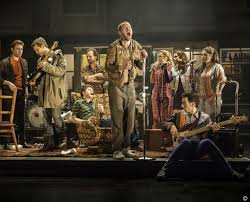 First it was a book. Then it was a movie. Now The Commitments is a West End show.
First it was a book. Then it was a movie. Now The Commitments is a West End show. November 22nd marks the 50th anniversary of the assassination of John F. Kennedy.
November 22nd marks the 50th anniversary of the assassination of John F. Kennedy.
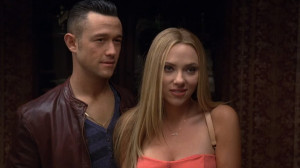 Don Juan is the universal term for describing someone who is a womanizer. Don Jon is a new film about a New Jersey man named Jon who is addicted to sex, and who can’t get enough of it, either from various women, or especially from the internet.
Don Juan is the universal term for describing someone who is a womanizer. Don Jon is a new film about a New Jersey man named Jon who is addicted to sex, and who can’t get enough of it, either from various women, or especially from the internet. Michael Fassbender. Penelope Cruz. Cameron Diaz. Javier Bardem. Brad Pitt. These are the stars of the new film The Counsellor, a film that doesn’t make a whole lot of sense.
Michael Fassbender. Penelope Cruz. Cameron Diaz. Javier Bardem. Brad Pitt. These are the stars of the new film The Counsellor, a film that doesn’t make a whole lot of sense.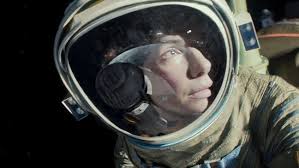 Gravity, the new film starring Sandra Bullock and George Clooney, literally kept me holding my breathe for the entire duration of the film. It is that intense, dramatic, and excellent.
Gravity, the new film starring Sandra Bullock and George Clooney, literally kept me holding my breathe for the entire duration of the film. It is that intense, dramatic, and excellent.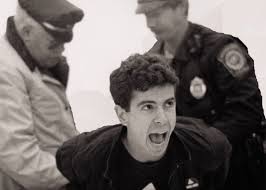 How to Survive a Plague (Directed by David France), nominated this past year for an Academy Award for Best Documentary, begins in 1987, six years into what activist Larry Kramer called ‘The Plague’ – the AIDS crisis.
How to Survive a Plague (Directed by David France), nominated this past year for an Academy Award for Best Documentary, begins in 1987, six years into what activist Larry Kramer called ‘The Plague’ – the AIDS crisis.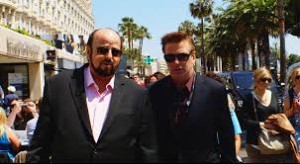 Seduced & Abandoned is not your typical documentary. It is a documentary about a film that will or will not be made. Ultimately, is this film a real film? Or was it made up just to make this documentary?
Seduced & Abandoned is not your typical documentary. It is a documentary about a film that will or will not be made. Ultimately, is this film a real film? Or was it made up just to make this documentary?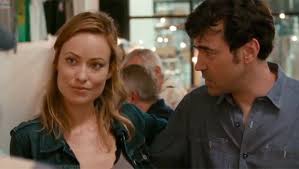 Sometimes when you go see a film that you know very little about and don’t know what to expect, it usually lets you down. But in the case of the new film Drinking Buddies, the opposite is true. It is a delightful movie.
Sometimes when you go see a film that you know very little about and don’t know what to expect, it usually lets you down. But in the case of the new film Drinking Buddies, the opposite is true. It is a delightful movie.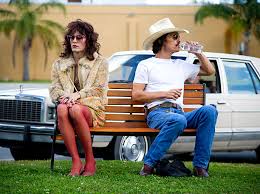 Dallas Buyers Club trailer – Film
Dallas Buyers Club trailer – Film





